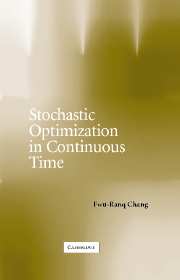Book contents
2 - Wiener Processes
Published online by Cambridge University Press: 06 January 2010
Summary
Introduction
In this chapter we introduce the concept and the major properties of a Wiener process. This stochastic process is essential in building the theory of stochastic optimization in continuous time. Unlike Chapter 1, we provide proofs for most of the theorems, because going through the proofs will enhance our understanding of the process under study.
We begin with a heuristic approach to the Wiener process. Specifically, the Wiener process can be generated as the limiting process of the random walk by letting the time interval go to zero. Then we introduce Markov processes, a subject familiar to economists. The purpose is to show that a Wiener process is a Markov process with a normally distributed transition probability. That gives us another perspective on Wiener processes. Finally, we formally define a Wiener process and show its major properties, using a measure-theoretic approach. Section 2.4.1 shows various ways to generate more Wiener processes from a given one. We stress that the understanding of the zero set is crucial to have a good grasp of this special stochastic process. We also stress that the sample path of a Wiener process is everywhere continuous and nowhere differentiable.
A Heuristic Approach
From Random Walks to Wiener Process
Recall that a random walk is a stochastic process such that, at each time interval Δt, it takes a step forward with probability p, and a step backward with probability 1 – p, and such that all steps are mutually independent.
- Type
- Chapter
- Information
- Stochastic Optimization in Continuous Time , pp. 24 - 55Publisher: Cambridge University PressPrint publication year: 2004



